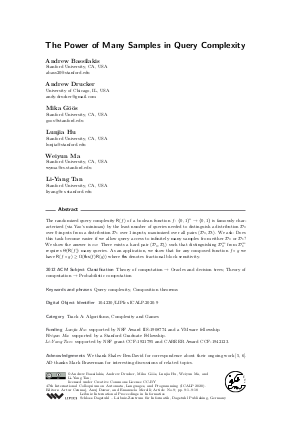@InProceedings{bassilakis_et_al:LIPIcs.ICALP.2020.9,
author = {Bassilakis, Andrew and Drucker, Andrew and G\"{o}\"{o}s, Mika and Hu, Lunjia and Ma, Weiyun and Tan, Li-Yang},
title = {{The Power of Many Samples in Query Complexity}},
booktitle = {47th International Colloquium on Automata, Languages, and Programming (ICALP 2020)},
pages = {9:1--9:18},
series = {Leibniz International Proceedings in Informatics (LIPIcs)},
ISBN = {978-3-95977-138-2},
ISSN = {1868-8969},
year = {2020},
volume = {168},
editor = {Czumaj, Artur and Dawar, Anuj and Merelli, Emanuela},
publisher = {Schloss Dagstuhl -- Leibniz-Zentrum f{\"u}r Informatik},
address = {Dagstuhl, Germany},
URL = {https://drops.dagstuhl.de/entities/document/10.4230/LIPIcs.ICALP.2020.9},
URN = {urn:nbn:de:0030-drops-124163},
doi = {10.4230/LIPIcs.ICALP.2020.9},
annote = {Keywords: Query complexity, Composition theorems}
}

 Creative Commons Attribution 3.0 Unported license
Creative Commons Attribution 3.0 Unported license

